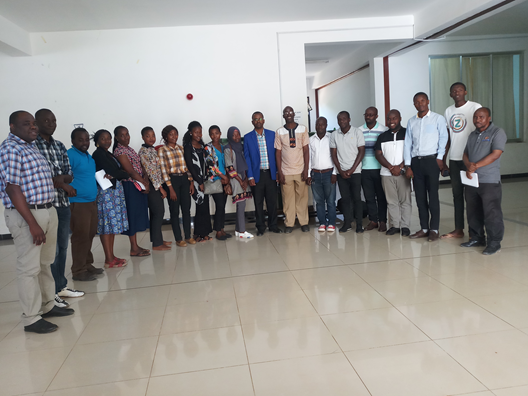As a strategy for increasing outcomes and sustaining provision of short courses, Sokoine University of Agriculture (SUA) is expanding collaboration with other stakeholders in offering training on fish farming. This has been the case for recent initiative in which SUA in collaboration with University of Dodoma (UDOM), Aquaculture Association of Tanzania (AAT) and Mongola Agri-Enterprises conducted a one week training workshop on “production of catfish fingerings” (translated in Kiswahili as “Uzalishaji wa vifaranga vya samaki aina ya kambale”).
The training, which aimed at providing knowledge and skills for production of catfish fingerings, was conducted from 30th September to 5th October 2019. Two participants of this training had previously attended a short course on tilapia fish farming which was conducted by Department of Animal, Aquaculture and Range Sciences (DAARS) in collaboration with Institute of Continuing Education (ICE), SUA from 6th to 9th May 2019. They attended this latest training for acquiring knowledge and skills for expanding their agri-business projects which they have established to include not only farming of tilapia fish but also catfish.

Photo 1: Participants of the training on catfish fingerings production posing for a group photo with the guest of honor at the closing ceremony, Dr. Josephat Peter Kirigiti (Centre, in blue suit), the Deputy Principal College of Natural and Mathematical Sciences at UDOM.
Participants of the Short Course
This training was offered to 24 participants constituting about 30% female and 70% male for duration of one week. Participants of the training came from Dodoma, Morogoro and Dar es Salaam and had different academic backgrounds, which added flavor to the training for enhancing sharing of knowledge and experiences among them.
Main objective of the training
The main objective of the training was to impart knowledge and skills on catfish artificial propagation to Staff and student of University of Dodoma, and Mongolo Agri-Investment
Learning Outcomes
At the end of training, participants were expected to acquire knowledge and skills on the following:
1. Artificial Propagation of African Catfish Knowledge introduced to participants
2. African Catfish fingerlings produced by participants after acquiring knowledge and skills
3. Hatchery of African Catfish production promoted among participants
Training Approach
The training was largely practical with minimal theory sessions for imparting knowledge and techniques for production of fingerings. It involved field visit at Mongolo Enterprises where beneficiaries of previous short courses at SUA have established a fish farm.
Topics covered
The contents of the training include the following topics:
• Introduction to propagation and contemporary issues affecting catfish propagation
• Introduction to African Catfish Propagation
• Practical on pituitary extraction and spawning induction (hormone inducement)
• Practical session on stripping, milting, fertilization and incubating of the eggs
• Live feed production and Larval food production
• Practical on Artemia production and Gemawin use for African Catfish larvae.
• Practical on overseeing hatchlings/larvae from the hatchery produced from the propagation, and
• Larviculture
Actual Training events in photos
 |
 |
 |
Photo 2: Process of extracting pituitary gland from the head of male catfish- a tiny white round material placed
at the middle of crucible (right) as hormone for hastening maturity of female eggs
 |
 |
 |
Photo 3: Classroom activity (left) and events of closing ceremony of the training workshop (right)
 |
 |
Photo 4: Fish fingerings hatchery at UDOM (left) and one month fingerings produced during the training (right)
Field visit
Participants visited fish farm at Mongolo Agri-Enterprises, at Mongolo area, Mapanga village, Chamwino District in Dodoman, which is located 105 km from Dodoma City Centre.

Photo 5: Participants of the training workshop visiting Mongolo Agri-Enterprises in Dodoma
 |
 |
 |
Photo 6: Earthen (natural) and plastic covered fish ponds at Mongolo Agri-Enterprises in Dodoma
Facilitation and Coordination
The training was conducted by Mr. Augustino Tegemea (DAARS, SUA) and Kusekwa Masondole (AAT) whereas the coordination role was done by Dr. Innocent Babili (ICE – SUA), Dr. Mtabazi Sahini and Dr. Salum Soud (UDOM), and Mr. Boniface Kobelo (Mongolo Agri- Enterprises).
Outcomes of the training
Notable outcomes of this training include enhanced collaboration between SUA and other actors in sustaining offering of the short course on fish farming. Participants of the training were successfully engaged in the production of catfish fingerings which are now two month old. These fingerings are available for use by Mongolo-Agri-Enterprises which is owned by beneficiaries of fish farming trainings offered by SUA.
Acknowledgment
The Institute of Continuing Education wishes to thank participants for attending the short course. Sincere appreciation goes to SUA, UDOM and Mongolo Agri- enterprises for supporting the running of the training workshop.
For more information about this short course, please send your email to Dr. Innocent Babili at ibabili@sua.ac.tz

